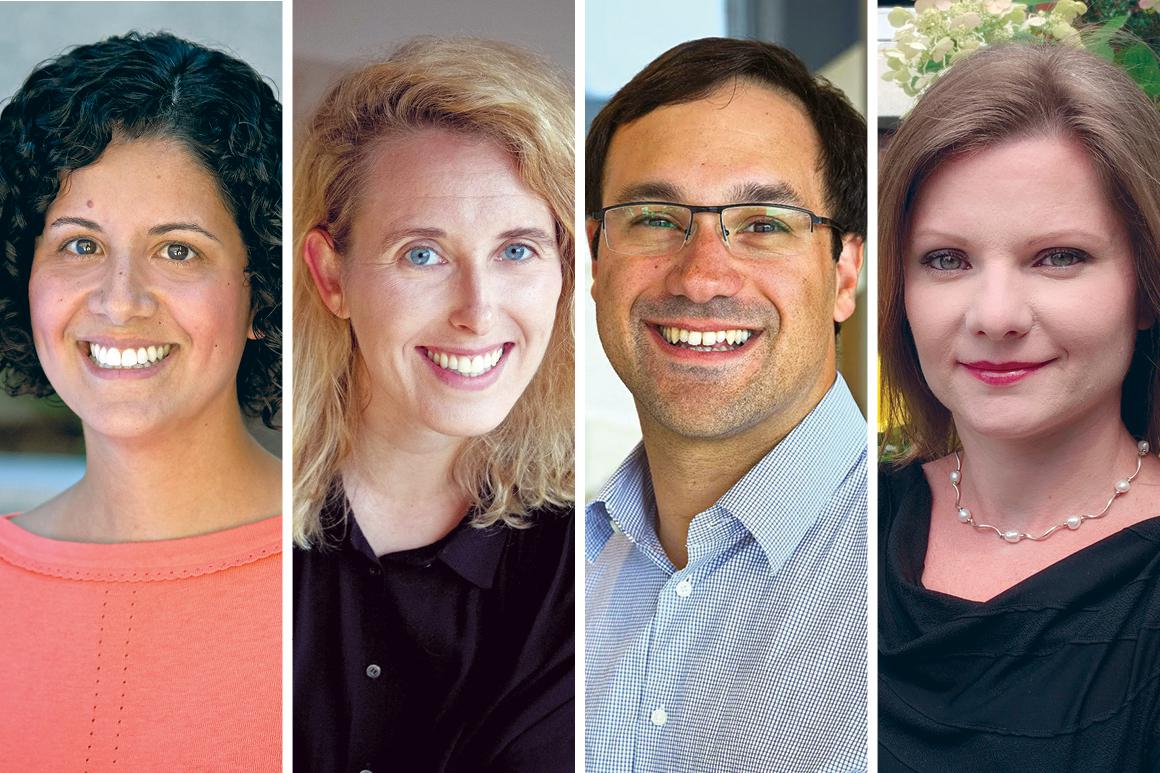From implementing video game technology to better understand neurophysiology to deciphering a mischievous smile from Machiavelli, Holy Cross faculty continue to advance research in their respective fields. Learn more about the four recently promoted faculty members to associate professor with tenure from the departments of education, political science, Spanish and psychology.
Faisal Baluch
Faisal Baluch, of the political science department, earned a B.A. in economics and finance from the University of Mauritius. He also earned an M.A. in applied finance from the University of Western Sydney. He then went on to receive an M.A. in political science from the University of Houston and earned his Ph.D. in political science at the University of Notre Dame. His research focuses on the history of political thought. He has offered a broad catalogue of courses, ranging from classes concerned with the Ancient Greeks (particularly, Plato and the Greek tragedians), to the Early Modern period and the Enlightenment, to Islamic political philosophy. He has been a member of the Holy Cross faculty since 2013.
What are you working on now?
I am currently working on a study of Socrates focused on his trial as depicted in the Platonic dialogues. The central question of this project concerns the justice of Socrates’s actions as depicted in Plato’s Apology. While in this dialogue Socrates repeats his famous profession of ignorance, namely that his wisdom lies in his knowing that he is ignorant, he also categorically states that he knows that attempting to kill a man unjustly is a great evil. To the extent that Socrates does not think himself guilty, I ask what his responsibilities are to ensure that his fellow Athenians do not engage in this great evil by sentencing him to death. The ultimate aim of my project is to shed light on the nature of the relationship between citizens and their political communities. In particular, I am interested in Socrates’s case as an illustration of the tension between what we owe to the community and what we owe ourselves.
Some of your past research has been dedicated to Machiavelli. What drew you to learn more about him?
There is a famous posthumous portrait of Machiavelli painted by Santi di Tito (1536-1603) that depicts the author standing in courtly garb looking directly at the viewer with a smile. Not unlike the mysterious smile of Mona Lisa, whether Machiavelli is offering up to the viewer a smirk of self-satisfaction, a mischievous grin, or something more genuine is not clear. To read Machiavelli’s work is to face a similar enigma. Here is an author who tells rulers not to concern themselves with morality, but who then also celebrates the virtue of the Romans; he warns against kindness, but then argues that sometimes cruelty leads to the kindest outcomes; and he declares himself the purveyor of the new, yet is a self-proclaimed student and celebrator of the past. It is these enigmas that attract me to Machiavelli’s work.
Lauren Capotosto
Lauren Capotosto, of the education department, earned a B.A. in English and political science from Villanova University before earning an M.Ed. in curriculum and instruction with a specialization in literacy at Lesley University. Capotosto also earned an Ed.M. in language and literacy and an Ed.D. in human development and education as a presidential fellow at Harvard University. Her research focuses on literacy development and instruction. Capotosto has been a member of the Holy Cross faculty since 2014.

What are you working on now?
I am currently working on two literacy-related research projects. The first is a multi-year study of middle school students’ reading habits and interests. Funded through a generous Scholarship in Action grant from the Andrew W. Mellon Foundation, this project examines the effects of making books easily accessible to students both inside the classroom and outside of school on youth reading practices. This project allows me to collaborate with local teachers and learn from middle school students. The second project I am working on aims to examine how faculty make the unique reading and writing practices in their fields of study explicit to college students. I have had terrific opportunities to collaborate with faculty across the College to learn about the literacy practices used by disciplinary experts. The goal of this work is to determine effective ways to teach these discipline-specific literacy practices to college students.
In the past, some of your research has focused on families accessing education. What drew you to this area of research within education?
I began my teaching career in the field of adult basic education. Many of my students were parents, and all of these students cared deeply about their children’s education broadly and their literacy development specifically. My students often described engaging literacy practices that they used at home with their children, such as creating their own stories when sharing books, that I had not yet learned very much about in my studies. I wanted to understand family literacy practices that schools can build upon to support children’s reading and writing development.
Rodrigo Fuentes
Rodrigo Fuentes, of the Spanish department, earned a B.A. from the University of Pennsylvania in comparative literature and politics, philosophy and economics. He also earned an M.A. and Ph.D. in romance studies at Cornell University. His research focuses on prose fiction in Spanish, narrative and visual arts, and contemporary Central American literature.
What are you working on now?
I’ve just finished a book of nonfiction that addresses the links between Guatemala’s political history of the past few decades and the life of my family; a center of gravity in the book is the assassination of my grandfather in 1979. It is titled “Mapa de otros mundos” and will be released at the end of May.
What attracted you to prose fiction in Spanish compared to other literary works?
I actually started writing poetry in my teens — cheesy and often dramatic poems — but poems nonetheless. I eventually gravitated toward stories because I became most aware of the way language changed me and the world around me by reading short fiction.
Ryan Mruczek
Ryan Mruczek, of the psychology department and neuroscience program, earned a B.S. in biological science at the University of Rochester and a Ph.D. in neuroscience at Brown University. His research focuses on primate vision, object and tool representations, experience-dependent plasticity, visual illusions and systems neuroscience methods. He has been a member of the Holy Cross faculty since 2018.
What are you working on now?
My research focuses on how the human visual system can efficiently process information about objects in our environment.In one project, we are studying a classic visual size illusion called the Ebbinghaus illusion. In this familiar illusion, a central circle looks smaller when surrounded by many larger circles, whereas it looks larger when surrounded by many smaller circles. Although this illusion was first described well over 100 years ago, it is still unclear exactly why it occurs. My lab is creating novel variants of this illusion to test the relative contribution of multiple neural processes to the illusory change in perceived size. In another project, my lab looks at how our past experience influences how quickly we can recognize objects. We use electroencephalography (EEG) to measure the speed and specificity of neural signals representing familiar and unfamiliar objects. Ultimately, both of these projects will uncover neural mechanisms that support our ability to live, perceive and act in a complex environment.
Last year, you attended a workshop that used a video game to help teach neurophysiology. How do you see innovative technologies like this affecting your field and how it’s taught in the future?
A key goal of the neuroscience program is that students connect fundamental STEM concepts with core neuroscience concepts. One such concept I want to introduce students to is the way in which a collection of neurons can process information using concepts from mathematics and computer science. In multiple courses, I have students use online simulations to build realistic neural circuits that perform simple computations, such as reflexes in a small robot. I also use software to simulate sophisticated neurophysiological experiments, quickly producing data that can be plotted and analyzed. Most importantly, these innovative technologies allow students to solve open-ended tasks and provide a concrete visualization of concepts we discuss in class. By exploring concepts through different disciplinary lenses, I hope students will see that questions they are interested in can be approached from many different directions. As a result, I hope students seek out a broad array of courses in many fields to support their own goals and interests.




